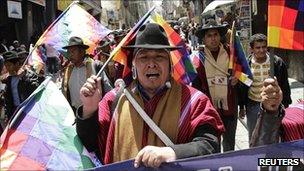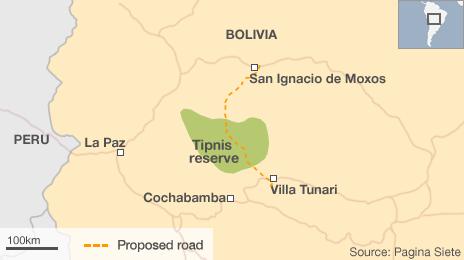Bolivia Amazon protesters resume Tipnis road march
- Published

The protesters - pictured here on 24 September - say they are determined to reach La Paz
Indigenous protesters in the Bolivian Amazon have resumed a long-distance march against a controversial road project, a week after their demonstration was broken up by police.
Around 1.000 protesters set off to complete the remaining 250km (155 miles) to La Paz.
Plans to build a highway through an indigenous rainforest reserve have sharply divided opinion in Bolivia.
Two ministers resigned last week amid outrage at the repression of the march.
"We have resumed the march and our intention is not to clash with anybody," indigenous leader Adolfo Chavez told Reuters.
"Instead of accusing the indigenous people, what the government should do is resolve the problem of the road once and for all."
Outcry
The protesters began their long march in August as part of a campaign against government plans to build a highway through the Isiboro Secure Indigenous Territory and National Park - known by its Spanish acronym Tipnis.
But halfway along their route they were first blocked and then dispersed by riot police using batons and tear gas.
Television footage of the police action provoked a national outcry, with large demonstrations of support for the marchers in La Paz and other cities.

There have also been protests in support of the road project
Defence Minister Cecilia Chacon resigned in protest, and Interior Minister Sacha Llorenti - who was in charge of the police - also stepped down.
Division
President Evo Morales suspended construction of the highway and promised a local referendum on whether it should continue, while denying responsibility for the police action.
The dispute over the Tipnis road project has divided the social movements that helped Evo Morales become Bolivia's first indigenous president in 2006.
President Morales says the road - which is being funded by Brazil and built by a Brazilian company - will boost economic development and regional integration.
But the protesters say it will encourage illegal settlement and deforestation in their rainforest homeland.
They and their supporters argue that Mr Morales is breaking his own commitments to protect indigenous rights and the environment.
But there have also been demonstrations in support of the road project from indigenous groups that remain loyal to the president.

- Published28 September 2011
- Published28 September 2011
- Published27 September 2011
- Published24 September 2011